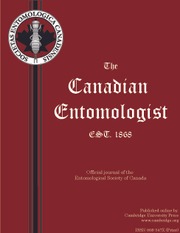Article contents
EFFECTS OF THE ANTIFEEDING COMPOUND AC 24055 (4′-(3,3-DIMETHYL-1-TRIAZENO) ACETANILIDE) ON LARVAE AND ADULTS OF DROSOPHILA MELANOGASTER (DIPTERA: DROSOPHILIDAE)1
Published online by Cambridge University Press: 31 May 2012
Abstract
The antifeeding compound AC 24055 (4′-(3,3-dimethyl-1-triazeno) acetanilide) was added to the diet of Drosophila melanogaster at several concentrations. Larval mortality and the duration of larval development increased significantly with increasing concentration from 125 to 625 parts per million (p.p.m.), and these effects were the same in males and females. Within this range of concentrations the weight of recently emerged adults declined with increasing concentration, the loss being greater for females than males. Egg production declined with increased concentration from 200 to 1000 p.p.m., particularly during the second week of egg production. Egg hatchability was not affected at 200 p.p.m., but from 400 to 1000 p.p.m. it declined rapidly from the second to the sixth day; with continued exposure, fertility was partly restored. The life span of adults decreased as the concentration increased from 500 to 1500 p.p.m. Concretions were observed in the Malpighian tubules of females reared in food containing 400 p.p.m. or more of the compound, but not in males.
- Type
- Articles
- Information
- Copyright
- Copyright © Entomological Society of Canada 1974
References
- 1
- Cited by


